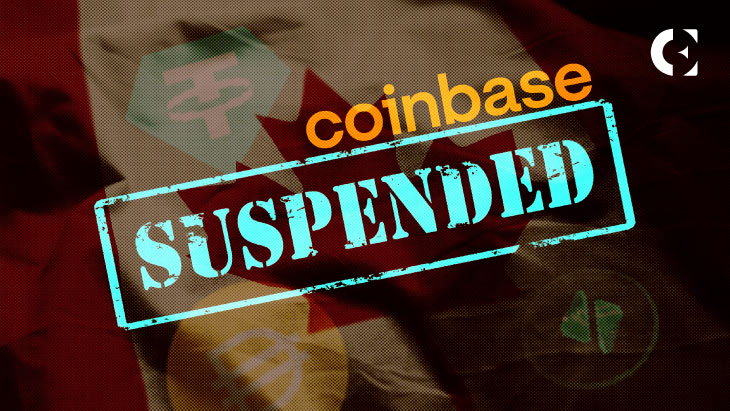- Coinbase suspends RAI, DAI, and USDT for its Canadian users.
- The stablecoins are apparently not meeting Coinbase’s listing standards.
- Coinbase recently launched new services for users in Canada.
In a recent email, crypto exchange Coinbase notified its Canadian users that it is suspending trading for RAI Reflex Index (RAI), Dai (DAI), and Tether (USDT), effective August 31. The exchange indicated that the abovementioned crypto failed to meet Coinbase’s “listing standards.”
Coinbase is not the first exchange to succumb to Canadian crypto regulations. Back in May, leading crypto exchange, Binance tweeted that it was exiting the Canadian marketplace, citing “new guidance related to stablecoins and investor limits.”
Similarly, back in January, an email from Crypto.com alerted its Canadian customers that it will delist USDT by the end of the month. A spokesperson noted that the decision came “in accordance with instructions from the Ontario Securities Commission (OSC) as part of our pre-registration undertaking for a restricted dealer license.”

Coinbase’s move comes after it launched a series of services in the country, in partnership with Peoples Trust Company. Canadian users can now instantly transfer money free of charge using Interface e-Transfers. Moreover, the expansion has enabled users’ access to Coinbase One, which supports zero trading fees and enhanced staking rewards. Furthermore, Coinbase stated:
Ranked as the world’s third-most crypto-aware nation, Canada boasts an enthusiastic local tech ecosystem that, combined with its strides towards a robust regulatory framework, positions it as a potential global crypto economy leader. This sentiment is reinforced by the Ontario Securities Commission’s survey, indicating that over 30% of Canadians are poised to venture into the world of crypto assets within the year.
In February, the Canadian Securities Administrators (CSA) announced new guidance for its domestic crypto industry. According to the press release, exchanges and platforms must follow the latest guidance to “enhanced investor protection commitments.” Moreover, firms that wish to operate in Canada need to adhere to a pre-registration process, alongside pursuing their formal registrations.
Additionally, the CSA recently cautioned Canadian crypto users to advise additional care when dealing with crypto trading service providers. According to CSA’s reports, several platforms are using “fake regulatory and dispute resolution organizations to appear legitimate.”
Disclaimer: The information presented in this article is for informational and educational purposes only. The article does not constitute financial advice or advice of any kind. Coin Edition is not responsible for any losses incurred as a result of the utilization of content, products, or services mentioned. Readers are advised to exercise caution before taking any action related to the company.







